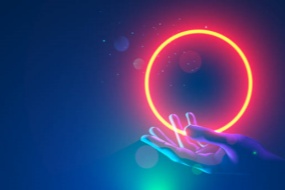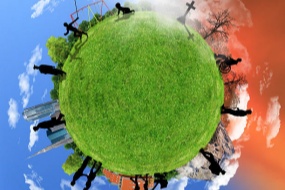Happiness Comes from Contentment
What is happiness? When you’re hungry, being full is happiness; when you’re tired, waking up refreshed is happiness. Feeling cold? Putting on an extra layer is happiness. If you’re exhausted, taking a rest is happiness; and when you’re out of money, earning some is happiness.
Only after enduring bitterness do we appreciate the beauty of the rainbow after the rain. The most important thing in life is to learn to let go. After all, sweetness is always accompanied by bitterness, and good fortune is always followed by misfortune. Don’t be misled by your own situation, failing to recognize contentment, and thinking that you are not happy enough, constantly pursuing a higher level of happiness, only to find that the effort does not match the initial satisfaction.

What is happiness then? Happiness has never had a standard answer. It is a feeling, a state of mind. It does not exist in the eyes of others, but within ourselves. As the saying goes, “As a man thinketh in his heart, so is he.” The same event, with different attitudes, brings about completely different experiences. Someone born into privilege, having everything they desire, may still feel unhappy, while you, despite your relentless efforts, may feel less fortunate. When we have no illness or disaster, we always feel that the more we have, the happier we are. But when we lose it, when we lie in a hospital bed, we regret how happy we once were. Have you noticed? Apart from illness, most of the pain we feel in life is not real, but rather a result of our own values.
The so-called happiness or unhappiness is all a matter of personal perception. When we feel content, we experience happiness; otherwise, we feel nothing but pain. So, what is happiness? In short, happiness is about being content. When tired, having a comfortable bed to sleep in feels satisfying and happy; when hungry, a delicious and substantial meal brings contentment and immense happiness; when feeling down, having a shoulder to lean on feels truly blissful. The sense of happiness is actually not so profound and unattainable. It is quite simple, depending on whether you can live in the present and be content.

Bian Zhilin once said: “You stand on a bridge and admire the scenery; the one admiring you is on a higher floor. The bright moon adorns your window, and you adorn someone else’s dream. Why always fixate on what you don’t have, envy what others possess, and fail to recognize what you have, which others also envy? In this world, it’s more important to see yourself clearly than to envy others. No one is perfect, nothing is flawless, sweetness always comes with bitterness, and fortune always comes with misfortune. Therefore, learning to let go and accept is more important than anything else. Don’t be misled by your own situation, always thinking that you are not happy enough. As a result, you complain about this and that, finding fault here and there. In the end, this constant agitation exhausts everyone, making no one happy.
In fact, the definition of happiness varies among 100 people, perhaps yielding 100 different answers. The only commonality is that happiness is always relative. When we were young, happiness was having something we liked, and once we had it, we felt very happy. As we grew up, happiness became a goal, and achieving it made us feel embraced by happiness. As we age, happiness becomes a state of mind, understanding contentment and cherishing blessings, which is the greatest happiness a person can have.







